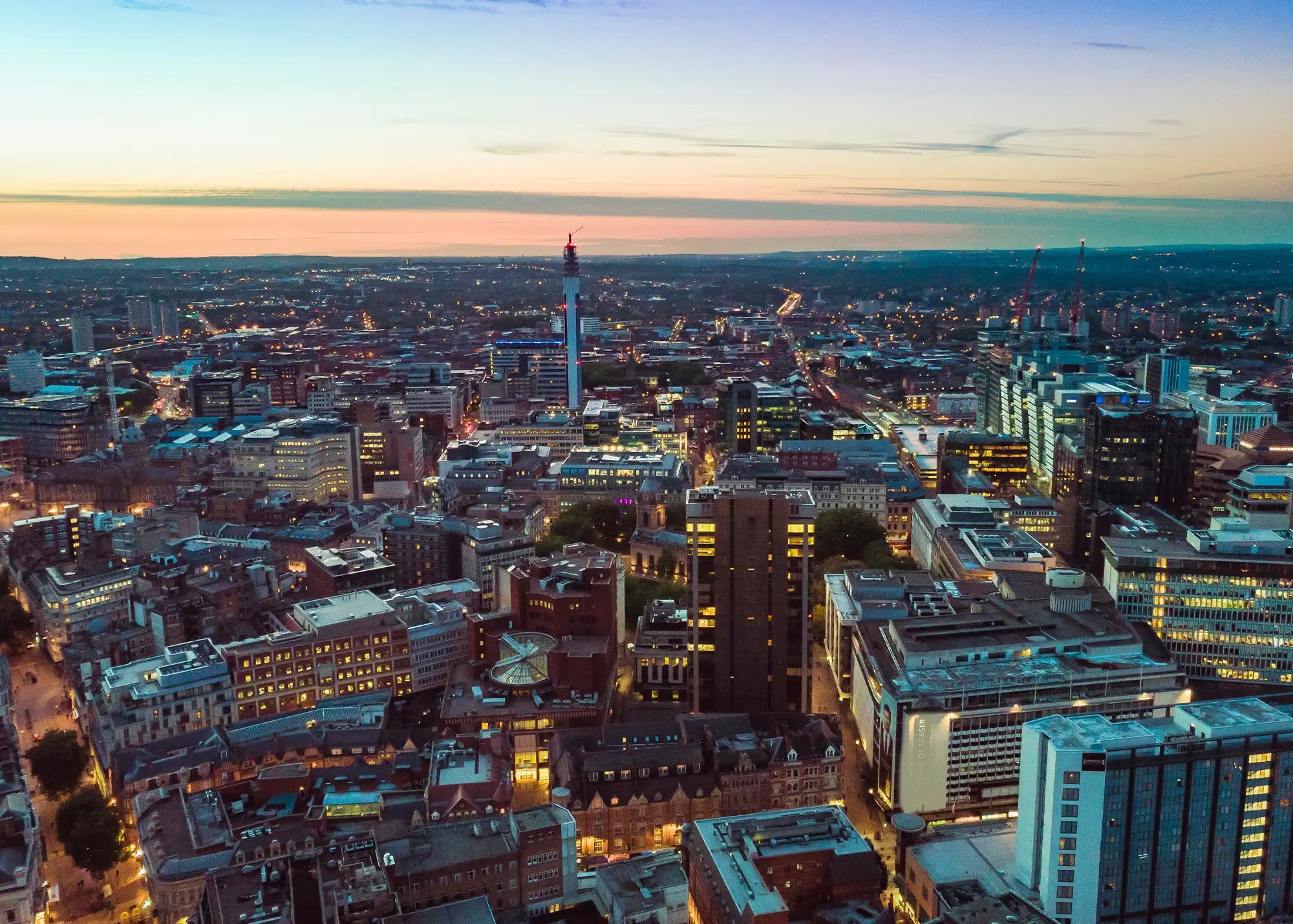
Published: October 3, 2024
Advice for Moving to Birmingham
Author: abbie
Published: October 3, 2024
Author: abbie

Considering a move to Birmingham? You’re in good company. Birmingham, often referred to as the UK’s “Second City” due to its population and size, is a dynamic metropolis known for its rich industrial heritage, vibrant cultural scene and extensive canal network—longer than Venice’s! It was a textile industry powerhouse historically and it has also played a crucial role in the UK music scene, with legends like Black Sabbath and Duran Duran both originating in the city. With the cost of living being so high in London, many are now choosing to relocate to this hub of commerce, education and creativity instead. But before you pack your bags, let’s look at some considerations about moving to Birmingham.
Here’s a breakdown of the key things to consider before a move to Birmingham:
Birmingham is extensive and so it caters to all budgets and tastes for accommodation choices. There’s everything from a modern apartment in the Jewellery Quarter to a spacious family home in Harborne or a charming Victorian terrace in Moseley, you’ll certainly be spoilt for choice. Each neighbourhood has its own unique character, so do your research to find the area that best fits your lifestyle. Whether you prefer the buzz of city living or the tranquillity of suburban life, Birmingham has a place for you.
Birmingham’s weather is typical of the UK, with mild summers and cool winters. Rain is a common feature throughout the year, so investing in a good umbrella is wise! The wettest months tend to be October through January, with April, May and July usually being drier. If you’re coming from elsewhere in the UK, the weather will be familiar, but if you’re new to the country, be prepared for the occasional downpour.
Birmingham’s central location makes it a key transport hub in the UK. The city has a great public transport network that includes buses, trains and the West Midlands Metro. Birmingham New Street is the city’s main railway station and it’s one of the busiest in the country. Here, you can travel to various places around the country. Birmingham Airport is also conveniently located just outside the city and it provides convenient access to both domestic and international destinations. If you’ll be commuting, consider your proximity to transport links when looking at accommodation.
If you’re moving for work, Birmingham offers a diverse and dynamic job market with plenty of opportunities for career growth. According to research, Birmingham has the second largest number of job opportunities outside of London after Manchester. There are several major companies here like HSBC, Deutsche Bank and Jaguar Land Rover. It’s also highly commutable to other large cities, including London, which you can get to in as little as 1 hour and 19 minutes.
Birmingham is a major student city and is home to five universities including the prestigious University of Birmingham and Aston University. The student population adds to the city’s vibrancy and diversity. If you’re a student moving to Birmingham, you’ll find a wide range of accommodation options in areas like Selly Oak, Harborne and Digbeth, each offering a mix of affordability, convenience and student social life. The city’s universities are also well-connected to the public transport network, which makes it easy to get to and from campus.
Whatever your hobbies and interests, you’ll find lots to enjoy here. Here’s a quick overview of what Birmingham offers:
Birmingham’s nightlife is as diverse as its population, with something to suit every taste. Whether you’re into chic cocktail bars, traditional pubs or busy nightclubs, Birmingham has it all. The city’s Gay Village around Hurst Street is a lively and welcoming area with a range of LGBTQ+-friendly venues. If you’re looking for a night out with a twist, Digbeth offers a more alternative scene with its independent bars, clubs and live music venues.
The city’s multiple museums are a great way to learn more about Birmingham’s role in the UK’s history and culture. The Birmingham Museum and Art Gallery is famous for its extensive collection of Pre-Raphaelite art, while the Thinktank Science Museum offers interactive exhibits perfect for families. If you’d like a glimpse into the city’s industrial past, the Black Country Living Museum is just outside Birmingham and is a must-visit.
Birmingham has a proud musical heritage too and famous bands Black Sabbath, Led Zeppelin, The Moody Blues and UB40 all hail from the city. Today, Birmingham’s music scene is still going strong, with venues like the O2 Academy, Symphony Hall and The Hare & Hounds hosting a wide range of live performances. Whether you’re into rock, classical or something in between, you’ll find plenty of options to enjoy live music here.
Brummies love their sport and there are plenty of options for both participants and spectators. Football fans can catch a match at Villa Park or St. Andrew’s, home to Aston Villa and Birmingham City, respectively. Cricket enthusiasts can head to the world-class venue that is Edgbaston Cricket Ground and fans of other sports like rugby, athletics and motorsports also have lots on offer.
According to the latest census information, Birmingham has a population of over 1.1 million people and has a great mix of different cultures. This gives the city a distinct character and energy. Whether you’re looking for a lively, creative hub or a quiet, family-friendly suburb, Birmingham has something for everyone. Here are some of the city’s most popular areas:
Harborne is a popular residential area located just three miles from the city centre. It is known for its leafy streets and excellent schools, and for having a wide range of shops and restaurants. Harborne is particularly popular with families and professionals and has a village-like atmosphere with all the amenities of city living within easy reach.
Kings Heath is a family-friendly area with independent shops, lively cafes and green spaces. The neighbourhood has a strong community spirit and has regular markets and festivals. Kings Heath is a great choice for families looking for a vibrant yet relaxed place to live—especially as it has great schools and parks too.
Moseley is a sought-after suburb with a bohemian vibe. The area has a range of independent shops, cafes, bars and a thriving arts scene. The area has beautiful Victorian homes and green spaces, including Cannon Hill Park, which is very popular. Moseley is a great place for those who enjoy a lively and creative environment.
The Jewellery Quarter is one of Birmingham’s most historic areas. It has a rich industrial heritage and creative scene. The area has recently become a popular residential district and has a mix of modern apartments and converted warehouses. This is perfect for those who seek a trendy, vibrant area with plenty of history and culture.
Solihull is a well-to-do suburb just outside Birmingham. It has excellent schools, great shopping and plenty of green spaces. For those who want a quieter, more suburban lifestyle that’s still within easy reach of the city centre, Solihull is a great option.
Digbeth is Birmingham’s creative zone. It is well known for its street art, independent shops and animated nightlife. The area has both embraced its industrial past and become a nucleus for the city’s young and creative types. With new developments and cultural projects emerging all the time, Digbeth is one of the most exciting places to live in Birmingham.
Birmingham offers a more affordable lifestyle compared to London and other major UK cities. Housing costs are significantly lower and there are more affordable options available whether you’re renting or buying. The cost of transportation, utilities and everyday expenses like groceries and dining out are also generally lower in Birmingham too. This means that your money goes further than it would in the capital.